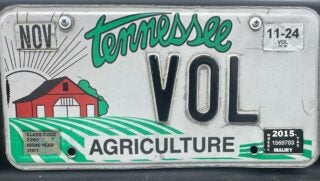We’ve all seen the animal rights activists’ attacks on social media. A dairy farmer posts a cute photo of a calf emerging from her hutch and animal rights activists are all over it like “white on rice,” telling everyone who will listen on social media the calf only has six weeks to live, is immobilized in the crate, and will soon be slaughtered as veal.
What farmers might not realize is this misinformation is not just happening on social media, but within our own communities. Thankfully our industry has an animal rights watchdog.
Since 1987, the Animal Agricultural Alliance has been bridging the communication gap between farm and fork. Another part of this non-profit organization’s role is to monitor those animal rights and environmental extremists who are opposed to agricultural industry practices.
“The first part is to understand the sheer number of groups out there,” said Hannah Thompson-Weeman, Vice President of Communications. “Usually people know about Peta — they’ve heard about them — but we have profiles on 60 different organizations that are from small, local fringe movements all the way up to groups like the Humane Society of the United States, which is a multimillion dollar organization investing a lot of time and money in these issues.”

Thompson-Weeman said that a lot of times when people think of animal rights, they think of spray-painting, vandalism, breaking in, protests, and things like that, but really the more dangerous side of the movement is the more sophisticated groups like the Humane Society of the United States. These groups are passing legislation, lobbying, trying to get ballot initiatives, meeting with restaurant and retail leaders and trying to get them to adopt certain policies that would impact farmers down the line. These professional type tactics are really hiding their true agenda .. which is animal rights.
“A lot of times when people think of animal rights, they think of these really extreme crazy people that no one is listening to,” Thompson-Weeman said. “But really the more dangerous groups are the ones hiding that true mission and just pretending like they are concerned about how we care for animals.”
According to the Animal Agricultural Alliance, these animal rights’ hidden agenda tactics are starting to hit at the local level…
CHURCHES
According to Kay Johnson Smith, the Animal Agricultural Alliance President and CEO, targeting people of faith is one tactic that the animal rights groups are using, in particular, the Humane Society of the U.S. and PETA.
“You would think it is not a very logical target audience to listen to their message and yet they have realized people of faith are very compassionate people,” Smith said. “They are also people that contribute to charitable causes more so they appeal to their compassion, appeal to their guilt for potentially eating animals and that if they give money to organizations that are supposedly looking out for the care of animals then it sort of helps them deal with the guilt they might feel for an animal giving its life for food.”
Smith said animal rights activists have been targeting faith-based organizations for about 10 years. A quiet movement, the activists are now making inroads into church leaderships across every denomination by focusing on food issues.
“They’re trying to utilize the term factory farming and targeting campaigns that say it’s ok to eat food but just don’t buy from factory farms,” Smith said.
The activists are also cherry-picking biblical scripture to meet their agenda, leaving off many passages or sections of passages, or twisting the meaning.
“Many people today, even faith-based people, are not very versed in biblical scripture so it is very easy to say ‘well the Bible says this’ but they are only saying half of the scripture,” Smith said.
The Animal Agricultural Alliance has conducted research in this area and has worked with theologians that are experts in the Old Testament and New Testament.
“They have provided example after example where it is taught in the Bible it is ok for people to raise animals for food and even in large numbers like we do today,” Smith said. “There is scripture that supports that. They’ve very concerned about how these animal rights organizations are twisting the meaning of the Bible to appeal to churches and people of faith.”
LAW ENFORCEMENT
Another community that has the Animal Agricultural Alliance concerned is law enforcement, as animal rights groups have been sponsoring events and hosting workshops on animal cruelty for them.
“While obviously, we would never support mistreatment or intentional cruelty to animals, it is the fact that these animal rights organizations — that ultimately believe that we shouldn’t be raising animals in any way for food — are introducing to law enforcement — that don’t really have a background in agriculture or animal husbandry practices — issues to them as if the standard practices are cruel in of themselves,” Smith said.
The Animal Agricultural Alliance has been encouraging farmers and ranchers across the country to get out and get involved. Meet local law enforcement. Bring them to your farm.
“Help them understand what you do and how you care for your animals so that when HSUS or PETA or other animal rights organizations show up and want to introduce them to their version of animal cruelty that they understand the difference between what is cruelty and what is the best industry practices,” Smith said.
Thompson-Weeman said a lot of times animal rights groups will start by buying equipment for a law enforcement office and then that leads to a relationship, or sponsoring an award for someone in law enforcement who did get involved in a cruelty situation or saved an animal.
“Most of those cruelty issues are about horses and that is kind of where it starts,” Thompson-Weeman said. “Their end goal is that they want to be seen by law enforcement as a resource and someone that can provide expertise on animal cruelty and animal care and that’s what we really have a concern about. They are not a trusted resource on that and shouldn’t be establishing themselves that way.”
THE GOOD SAMARITAN
“The other trend that we are potentially seeing, that has us very concerned, are animal right activists who have broken into farms in the dead of night and say that they have the right to do it because they have animal cruelty concerns,” Smith said. “They vehemently believe they have the right to do that with total disregard to the farm, to private property rights, or to the care of the animals.”
It’s also a disregard to the biosecurity of the animals. Smith shared a recent example where activists broke into a poultry farm and as a result the farm had to eliminate all the birds in that barn — thousands of birds — because of the biosecurity risk they posed for the other barns nearby.
As Thompson-Weeman points out, social media gets a lot of conversation and can be very valuable, but the agricultural industry should not forget the importance of one-to-one engagement.
“In your community, you are the face of agriculture. It is a small industry. There aren’t a ton of farmers and ranchers out there,” Thompson-Weeman said. “It is really kind of a responsibility to get involved in your community … host farm visits, if you can go to a school talk to students, speak to civic organizations, connect with the people at your church and local law enforcement … really any audience is going to be targeted by these groups so it is important for animal agriculture to get their first and be proactive and establish yourself as a source of information before there is an issue you are trying to react to because that establishes you as a credible source and builds a positive relationship that they will come to you when they have questions versus just listening to what they hear.”


